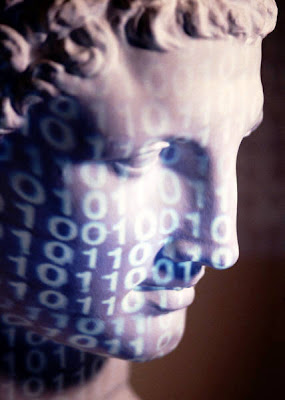Do we have the right, indeed the duty, to evaluate the messages from our political and spiritual leaders? I argue that this is imperative. Blind obedience to dogma, or unproven claims shouldn't be the response of an enlightened people.
As the intended recipient of the messages from the various Xtian leaders on the occasion of Easter , I feel the need to respond. They keep telling us that only through faith a person can achieve enlightenment and salvation. Take for example the
message from the Orthodox Patriarch Bartholomew who referred to the ‘arrogant human mind’ that attempts to harness the immensely stronger forces of nature, noting that this attitude is directly linked with the ‘spiritual deviation of the human race.’ Faith in the Risen Christ forms the only path modern man should follow, the Ecumenical Patriarch underlined.”
The heads of the Orthodox and Catholic Churches have often criticized humanism and the human mind’s attempt to make sense of the world around us through reason almost as a sin. Faith is the only and best way to understanding, they argue blissfully. I beg to differ.

On the contrary, it is faith that can easily lead to arrogance—especially by those who claim to know and speak the mind of God! Taking something on faith usually means don’t ask for evidence and don’t use reason to evaluate absolute claims.
It is reason and skepticism that can prevent us from following someone who claims to have a message from God or speak on God’s behalf. There would be no problem if we knew for sure that such claims had come from the Omnipotent, but who knows? History is full of leaders and followers who were convinced they were carrying out God's commands. Of course, any faithful person can choose to accept such messages and follow any leader (spiritual or political) without evaluating, without any evidence or reason, but I think we should know better in this 21st century.
I know it’s unpopular to speak truth to power these days, but especially this Holy week our senses are overwhelmed with messages from God that only the very few have heard and ask us to just obey. As a counterbalance, there have to be voices against such rhetoric of ignorance and exaltation for sheepishness.
It started with the Renaissance and culminated through the Enlightenment (17-18th centuries) when humanity re-discovered the ancient Hellenic civilization—one that the Orthodox Church in Byzantium tried to eradicate. It was the ancient culture which included the emphasis on reason, inquiry, and free expression, that laid, again, the foundations of our modern society.
It was through the path of the Enlightenment/Age of Reason—not divine revelation—that we can enjoy an unprecedented quality of life today. A better life with human rights, freedom of expression, which includes religious freedom.
So, I hope their holiness understand that I reserve my right to make up my own mind using the best tool I have available—reason. I won't claim it as infallible but its strength comes from acquired not revealed knowledge. And, it can be revised if better evidence is presented. What if they got it wrong? Maybe God wants us to use the mind he gave us...
 On the contrary, it is faith that can easily lead to arrogance—especially by those who claim to know and speak the mind of God! Taking something on faith usually means don’t ask for evidence and don’t use reason to evaluate absolute claims.
On the contrary, it is faith that can easily lead to arrogance—especially by those who claim to know and speak the mind of God! Taking something on faith usually means don’t ask for evidence and don’t use reason to evaluate absolute claims.














